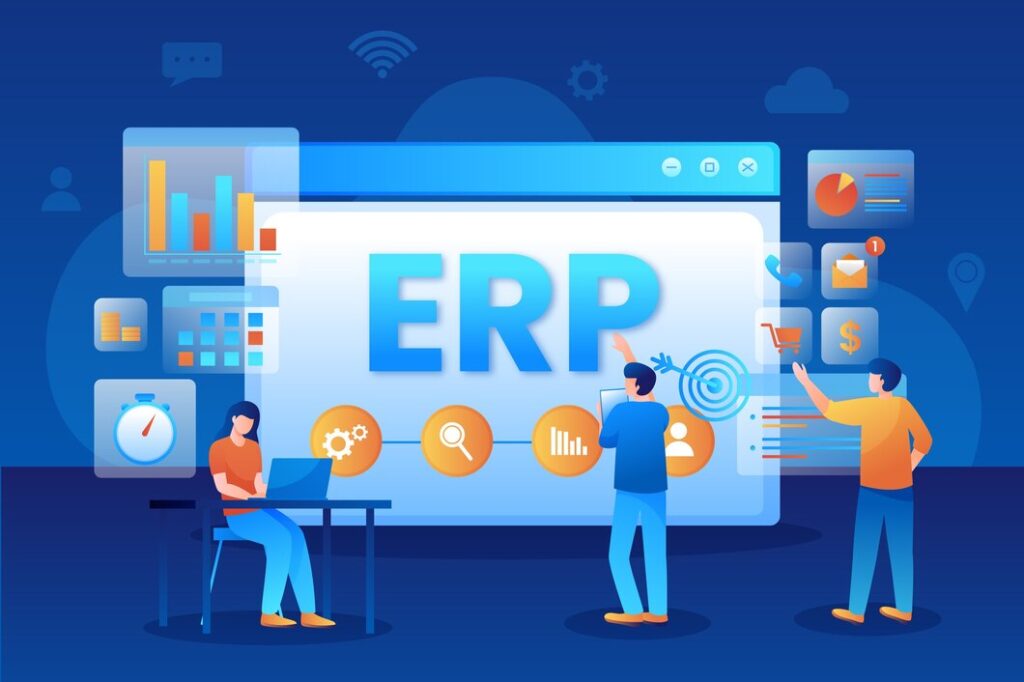
What Makes the Best ERP Software Stand Out in a Competitive Market?
In the world of enterprise resource planning (ERP) software, competition is fierce. With hundreds of solutions available, it can be overwhelming for businesses to decide which system best suits their needs. The ERP software market has grown exponentially as companies of all sizes increasingly rely on it to streamline operations, enhance productivity, and enable better decision-making.
But in such a crowded market, what makes the best ERP software stand out? The answer lies not only in the features they offer but also in how well they address the unique challenges faced by modern businesses. Let’s dive into the key characteristics that separate leading ERP software from the rest.
1. Scalability and Flexibility
One of the hallmarks of outstanding ERP software is its ability to scale with a business. The needs of a small business differ greatly from those of a multinational corporation. The best ERP systems are designed to grow with an organization, offering the flexibility to add new modules, users, and functionalities as the business evolves.
Scalability ensures that businesses won’t outgrow their ERP solution, avoiding costly and time-consuming migrations to new platforms. Flexible ERP software also allows companies to customize workflows, interfaces, and reporting capabilities to suit their unique processes.
Why It Stands Out:
An ERP that grows with your business ensures long-term value, eliminating the need for future replacements and ensuring seamless adaptation to your evolving needs.
2. Industry-Specific Capabilities
The best ERP software is often tailored to meet the unique needs of specific industries. A one-size-fits-all approach may not work for businesses in niche markets, such as manufacturing, healthcare, or retail. Industry-specific ERP solutions offer specialized modules and features that address the specific challenges these industries face, such as regulatory compliance, inventory management, or complex supply chain processes.
For instance, a manufacturing company might need ERP software with advanced inventory management and production planning, while a healthcare provider would benefit from features focused on patient data management and regulatory compliance.
Why It Stands Out:
By offering solutions tailored to a company’s specific industry, ERP software becomes an indispensable tool that aligns perfectly with business goals and operational needs.
3. Cloud Integration and Mobility
As businesses increasingly embrace remote work and global teams, cloud-based ERP solutions have become more essential. The best ERP software offers robust cloud integration, enabling access to real-time data from anywhere, on any device.
This mobility gives companies the flexibility to manage operations remotely and offers unparalleled access to critical information on the go. Cloud-based ERP systems also provide automatic updates, reducing downtime and ensuring the latest security features and functionalities are always in place.
Why It Stands Out:
Cloud ERP solutions are future-proof, offering flexibility, security, and global access, making them ideal for businesses with distributed workforces or operations spanning multiple locations.
4. User-Friendly Interface and Experience
Even the most feature-rich ERP system can fall flat if it’s difficult to use. A clean, intuitive user interface (UI) is crucial in ensuring that employees adopt the system efficiently. The best ERP software prioritizes user experience (UX), offering easy-to-navigate dashboards, customizable reports, and straightforward workflows that minimize the learning curve.
A poor UI can slow down implementation, cause user frustration, and even lead to costly errors. Conversely, an intuitive ERP system promotes productivity, as employees can quickly learn to navigate and use the system without extensive training.
Why It Stands Out:
A user-friendly interface boosts employee productivity, reduces errors, and ensures higher levels of user adoption, which is critical for ERP success.
5. Advanced Data Analytics and Reporting
One of the primary functions of ERP software is to centralize data and provide insights that help businesses make informed decisions. The best ERP systems go beyond simple data storage and offer advanced analytics and reporting tools. This includes customizable reports, real-time dashboards, predictive analytics, and data visualization features that make complex data easy to interpret.
With the rise of big data, artificial intelligence (AI), and machine learning (ML), leading ERP solutions incorporate these technologies to provide deeper insights, identify trends, and automate decision-making processes.
Why It Stands Out:
ERP systems with powerful analytics turn data into actionable insights, helping businesses make informed decisions faster, improve forecasting, and optimize operations.
6. Integration with Other Software
A top-tier ERP system doesn’t exist in isolation—it needs to integrate seamlessly with other software applications used by the business. This includes accounting software, customer relationship management (CRM) platforms, eCommerce systems, supply chain management tools, and more.
The best ERP software offers robust integration capabilities, either through built-in APIs or third-party connectors. Seamless integration ensures data flows smoothly across different departments, eliminating the need for manual data entry and reducing errors.
Why It Stands Out:
Integration capabilities make an ERP system more versatile and valuable by ensuring it becomes the central hub for all business operations, enhancing cross-functional collaboration.
7. Strong Security Features
Data security is a top concern for businesses of all sizes, especially when dealing with sensitive financial, customer, and operational information. The best ERP software includes robust security measures such as role-based access control, multi-factor authentication, data encryption, and audit trails to safeguard data.
As cybersecurity threats continue to evolve, leading ERP providers invest heavily in security updates and compliance with industry standards such as GDPR, HIPAA, or ISO certifications, ensuring that their software meets the highest levels of protection.
Why It Stands Out:
Strong security features protect a company’s most valuable data, mitigating the risk of breaches, ensuring compliance, and building trust with customers and stakeholders.
8. Efficient Customer Support and Training
Implementing ERP software can be a complex and lengthy process, requiring extensive support during and after deployment. The best ERP software providers offer comprehensive customer support, including 24/7 availability, dedicated account managers, and on-demand technical assistance.
Additionally, leading vendors provide training resources, both in-person and online, to ensure that users can make the most of the system’s capabilities. This often includes video tutorials, knowledge bases, and regular updates to documentation.
Why It Stands Out:
Exceptional support and training minimize downtime, speed up the implementation process, and ensure the business gets the full value out of its ERP investment.
9. Cost-Effectiveness and ROI
ERP software represents a significant investment, but the best solutions provide a clear return on investment (ROI). This includes increased operational efficiency, reduced manual processes, and improved decision-making, all of which lead to cost savings over time.
Many ERP providers now offer flexible pricing models, including subscription-based (SaaS) options, which reduce upfront costs and allow businesses to scale their investment as they grow. An ERP solution that delivers tangible business outcomes within a reasonable timeframe stands out as a cost-effective and valuable investment.
Why It Stands Out:
By delivering measurable ROI, cost-effective ERP systems justify their expense and prove their worth by enhancing productivity and reducing operational costs.
Conclusion
In a competitive market, the best ERP software stands out by offering scalability, industry-specific capabilities, and robust integration features. Cloud integration, user-friendly interfaces, and strong data security are essential in ensuring the software can meet the demands of modern businesses. By focusing on delivering measurable ROI, advanced analytics, and excellent customer support, top ERP solutions provide long-lasting value.
Choosing the right ERP software is a crucial decision that impacts the efficiency and success of your business. By prioritizing these key features, you can select a system that not only meets your current needs but also adapts as your business grows and evolves.



